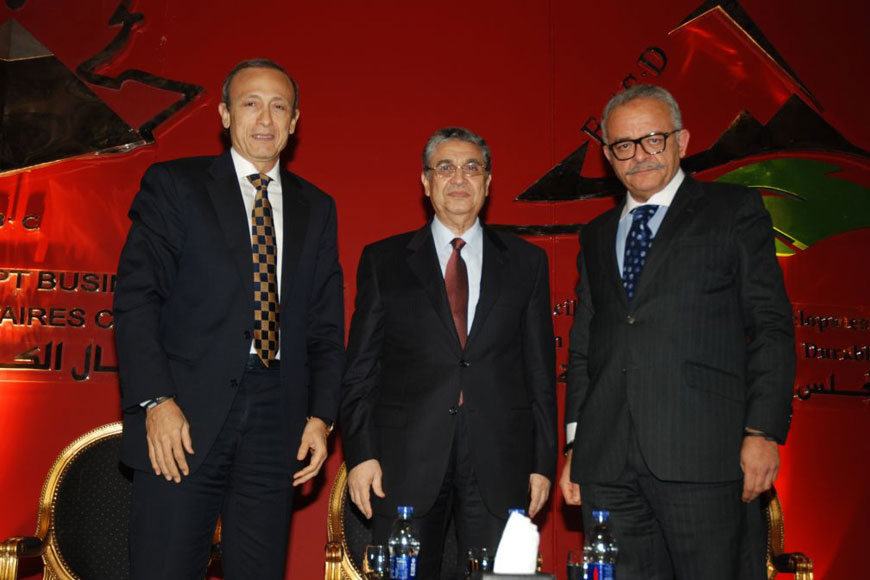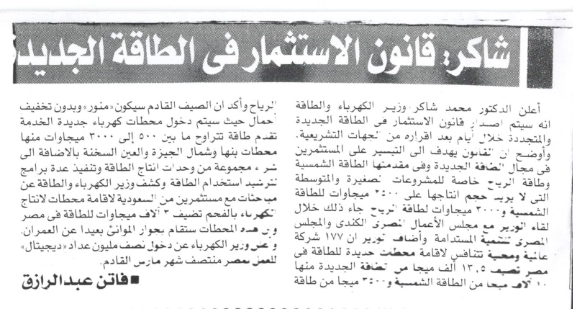
Date
Speaker(s)
Designation
Description
Under the title “Egypt’s Electricity Crisis…Challenges & Opportunities”, the Canada Egypt Business Council (CEBC) and the Egyptian Council for Sustainable Development (ECSD) hosted an event featuring H.E. Dr. Mohamed Shaker Minister of Electricity and Renewable Energy. Esteemed guests and former ministers including Dr. Amre Moussa, Dr. Mostafa Al Saeed, Dr. Hassan Younes, Dr. Ibrahim Fawzy, Dr. Hany Helal, Eng. Alaa Fahmy, Mr. Osama Heikal attended the discussion, as well as CEBC’s and ECSD’s esteemed members, guests, businessmen and reporters.
Ambassadors of Czech Republic, Cuba, Georgia, Kazakhstan, Republic of Cyprus, Republic of Serbia, Republic of Lithuania, as well as the Canadian Ambassador to Egypt Troy Lulashnyk were also in attendance.
In his opening remarks, Eng. Motaz Raslan observed that the crisis of electricity in Egypt is one that has been inherited throughout consecutive governments that ignored the rising consumption of electricity and failed to put strategies to secure future needs of the country or even following in the world’s footsteps by resorting to new and renewable sources of energy. He also highlighted that the crisis affects all sectors of society and has negative repercussions on the economy, as well as on the investment climate.
Minister Shaker assumed the floor following the Chairman and showcased to the audience through an informative presentation the challenges currently facing the electricity sector in Egypt as well as the future plans to tackle the electricity crisis.
Shaker first pointed to independent recent studies completed by Booze & Company that claims that Egypt’s power consumption has been growing at a faster rate than both its GDP and population. This annual rate increase, which is comprised of 6%, is driven mainly by the increase in residential consumption. Currently 43% of Egypt’s power consumption is residential, which the minister attributes to urban expansion and the increase of electrical appliances in people’s homes.
Explaining the recent power outages throughout Egypt last summer, Shaker noted that summer electricity consumption is higher than the winter one with around 3,000 to 35,000 mega watt, mainly due to the use of air conditioners.
Another reason for the outages is that Egypt’s installed capacity is close to “peak load demand”, with a reserve margin of 14%. This is a low percentage since the Energy Information Administration marks the reserve capacity between 25-35%. This has meant that Egypt’s capacity is always at a risky level that leads to power outages, especially when combined with any equipment going out of operation for maintenance for example.
In his speech, Shaker addressed the three main related challenges associated to frequent electricity outages. The first challenge is fuel shortages especially in natural gas, which Egypt heavily relies on.The second challenge is the low availability factor of power plants when compared to benchmarks. This is due to lack of maintenance and the aging of Egypt’s power plants. The third challenge is transmission constraints and losses, where high technical and commercial losses pass over 15% of total generated electricity. He also noted that the high operational cost of power as well as the rising fuel prices worldwide is an added challenge.
The minister then proceeded to disclose future plans that the ministry has been working on to tackle the electricity crisis. To put things in perspective, under the current demand and supply fundamentals, Egypt would need to increase its installed capacity by 18 giga-watts by the year 2020.
Moving forward, the minister pointed out to the importance leading an “energy mix” plan in Egypt by increasing renewable energy sources such as wind energy and solar energy, with less dependence on sources of energy such as natural gas. He outlined four different scenarios for completing the plans, but he noted however the high cost of implementing these plans that can reach billions of US Dollars.
Currently power projects are carried out by the ministry and are financed by banks and various global institutions. Among the ministry’s plan is to also provide encouragement to the private sector to invest in renewable energy such as solar and wind energy to lift the expenses burden from the government. So far, these initial plans have attracted about 177 local and foreign applicants according the Shaker.
Shaker outlined in his speech initiatives in order to control the current electricity load. There is a plan to improve the distribution networks in order to each “smart grids system” within ten years. Currently there are around 31 million mechanical electricity meters, which are estimated to increase by ten more million to reach 41 meters within ten years. This ambitious plan to migrate to this system and its smart meter is estimated to cost 25 to 35 Billion Egyptian Pounds. Still, they would help in decreasing power wastage and lead to better control the consumption of power throughout the country.
There is also a plan going into action soon, where the government will distribute throughout consumers’ homes ten million LED lamps to save precious mega watts. To relieve the burden of the higher cost of the LED lamps, the cost will be added to consumers’ electricity payments and installed over a period between 20 or 24 months. The government will also exchange around one million street light lamps with LED ones before summer 2015. The latter initiative alone is projected to save around 200 to 250 mega watts.
In his speech, minister Shaker addressed one of the audience’s biggest concerns, which is the government’s plan to prepare for the summer of 2015. Maximum capacity levels expected in the upcoming summer is set to reach 30,950 mega watts, whereas current capacity is only 24,500 mega watts. However with new power plants set to complete soon and enter the electricity capacity, the minister pointed that there would only be a deficit of around 2,000 mega watts.
He also pointed out that there is a priority being given to maintenance routines and following their schedules diligently, since maintenance failures are one of the reasons for power outages every summer. While he told the audience that he couldn’t promise a summer free power outages, he assured that at least there will be vast improvement than the summer of 2014.
The floor was then opened for a questions session where a wide range of important topics were raised such as the ways the ministry would finance the ambitious summer plan, whether Egypt will venture into atomic energy, and alternate solutions to conserve power.






















